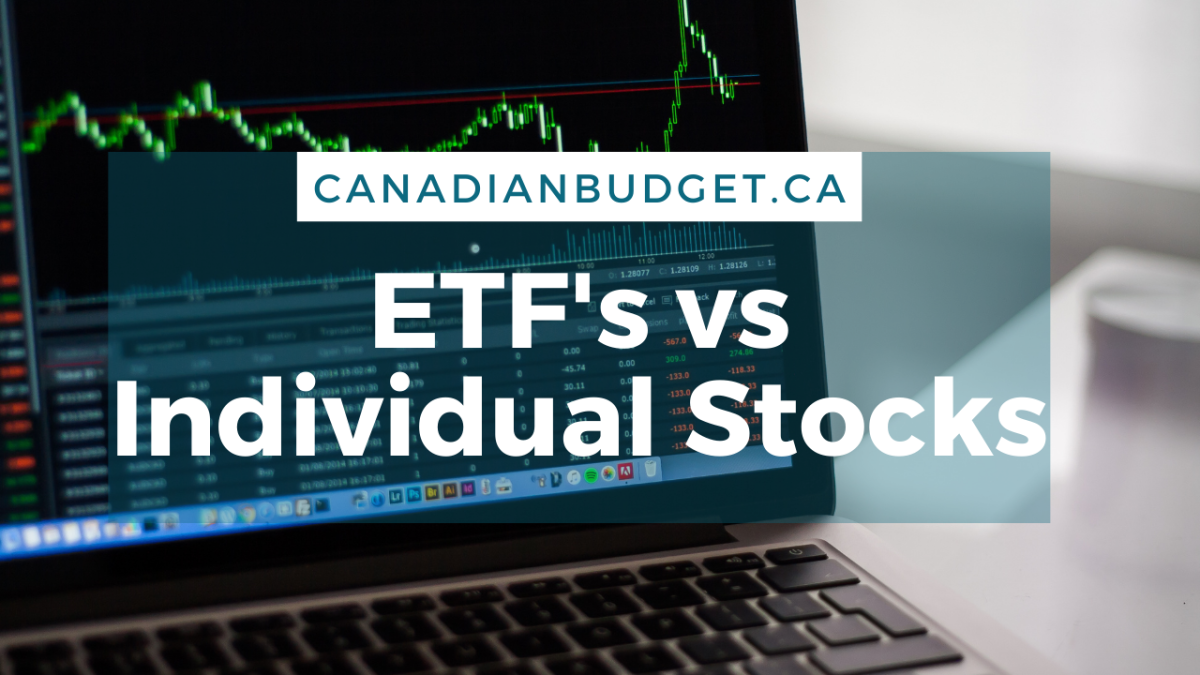Comparing ETF's vs Individual Stocks
Table of Contents
ToggleWant to start investing, but have no idea where to start or what investments to choose? Choosing between ETF’s vs stocks is one decision you may need to make. If you are turned off by the high cost of the top stocks to purchase just a single share, you are not alone! What if I told you you could own shares in Google, Amazon, and other top name companies. And that you could buy them for much less than the individual share price. You may have asked yourself waht is the difference between ETF’s vs stocks, I am here to answer that for you!

You can! No, its not a trick or a scam. You can do this by investing in an Exchange Traded Fund (ETF) or Index Fund.
Many people are put off by the thought of investing because they think they cannot afford the price of stocks, or that investing is too complex. I want to let you know that neither of those things are true! Beginners can start investing with very little money.
What are ETF’s or Index Funds?
Well they are quite similar, for the purposes of beginner investors, you really don’t need to dive too deep on the differences. Basically, these are large funds comprised of multiple companies’ stocks, which track an industry or the whole stock index. By buying an ETF or index fund, you will end up owning a basket of many companies’ stocks under the umbrella of a single fund.
Benefits of an ETF or Index Fund
They can track things like whole stock indices – like the S&P 500 for example- where you end up owning a bit of everything in the market. This makes your risk exposure much lower than if you had purchased an individual stock. In additions, there can be funds which track certain industries, if you have a particular interest in say Aerospace, Transportation, or Technology. An ETF is the investing version of not having all your eggs in one basket (eg. Picking a single stock).
An ETF Example
Let’s look at one ETF which focuses on a single sector: cloud computing (SKYY). It holds all of the top technology companies in their portfolio.

By owning shares of SKYY you would be owning a part of everything they hold. I am not recommending SKYY, just using it as an example. SKYY holds all the top tech company funds such as Google, Amazon, Microsoft etc…

Risk Exposure of ETF’s vs Stocks
When you purchase and ETF or index fund, your risk exposure is much less than if you were to own a few of the individual stocks since you are holding a large basket of funds. Whereas when you are picking individual stocks, your profit and loss depends on the fortunes of one company alone. Even people who make their livings managing funds and picking stocks for investors and financial institutions, can’t consistently beat the market. That is why I prefer whole market ETFs or Industry specific ones if you have a special interest, as opposed to picking individual stocks.

Your investing style
If you have started investing already, let us know what kind of investor you are. Are you into individual stocks or ETF’s or a combination of both? Leave a comment below!
If you have not started investing yet, what is holding you back? If you are a Canadian, a great way to get started is with Wealthsimple. They make it incredibly easy with an extremely user friendly platform and multiple methods to choose from – Wealthsimple Invest offers the ability to have TFSA, RRSA, or unregistered personal accounts to invest – using their own pre-packaged funds based on your risk tolerance and goals.
Wealthsimple Trade offers you the ability to manage your own investment portfolio by choosing to invest directly in ETF’s, Index Funds, and Individual Stock. I have been using them for a number of years now, and strongly recommend them for anyone new to investing who wants to get started.
As a DIY investor, you may be choosing from ETF’s vs Stocks, or you may choose a mix. It really comes down to your own personal investment strategy and goals.
Share your investment strategy or concerns below!
For more content like this check the Finance and Investing Section of the blog
This is not a recommendation of these stocks, always do your own research and consult a financial advisor. This post is for entertainment and education purposes only.
About The Author
Jessica Morgan
Jessica Morgan is the founder and CEO of Canadianbudget.ca. She is passionate about personal finance and helping Canadians improve their financial literacy by providing more Canadian focused financial content. A millennial mom of one, she has a burning obsession with all things personal finance.
Jessica has a BA in East Asian Studies from York University and a Masters in Business Administration from Toronto Metropolitan University. She is a career public sector employee with a Hybrid Pension, and an advocate for Canadian women to improve their personal finance knowledge.

